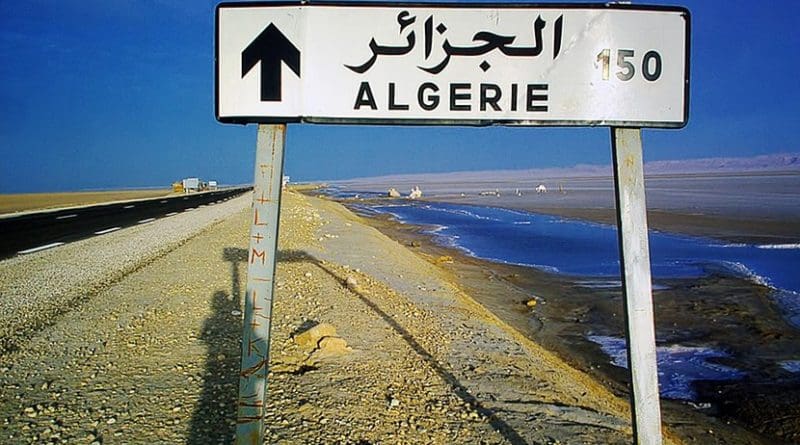Is There Genuine Change In Algeria? – Analysis
By Observer Research Foundation
The Algerian protesters appear to have learnt the lessons of the Arab Spring.
By Pinak Ranjan Chakravarty*
After weeks of public protests demanding that Algerian President Abdelaziz Bouteflika step down, the 82-year-old leader who has ruled for 20 years has finally announced that he will leave office. The pressure on him to quit came not only from the protesters but also from the ruling National Liberation Front (FLN)’s coalition ally as well as the country’s powerful military.
The protests that have convulsed the country have been peaceful by and large. The demonstrators are mostly young and are worried about unemployment. About 70% of the Algerian population is under the age of 30 years. It seems as though Algeria has reached the Rubicon; it is a matter of time before it crosses it.
An earlier statement from Bouteflika stated that while he would not seek a fifth term in office, he would carry out “deep reforms” in various fields. The same statement announced that the presidential election, slated for April 18, would be postponed. This has led to suspicion that Bouteflika intends to find ways to keep much of his ruling elite intact. The new Prime Minister and former Interior Minister, Noureddine Bedoui, has compounded the suspicion by supporting the postponement of polls.
A charmed career
Bouteflika, like many authoritarian rulers in the Arab world, has had a charmed career. Though seen as a controversial politician in his country, many give him credit for ending the bloody civil war that killed around 200,000 Algerians in the 1990s. But like many authoritarian leaders in the Arab world, he has outlived his acceptance with the people of Algeria.
Born in the Moroccan town of Oujda, Bouteflika was originally from Tlemcen in Western Algeria. When he was 19, Bouteflika joined the National Liberation Army (ALN), the fighting arm of the FLN, which was then engaged in the independence war against colonial occupation by France. He rose rapidly through the hierarchy and became a trusted aide of Houari Boumediene, the ALN leader who usurped power in 1965 after Algeria achieved independence in 1962. He was the Minister for Youth, Sports and Tourism in the government of Ahmed Ben Bella. Thereafter, he became the youngest Foreign Minister in the world in 1963.
Algeria’s foreign policy as an independent country was moulded by Bouteflika and was influenced primarily by the experience of the war for independence. It was, therefore, natural that Algeria was active in the decolonisation and Non-Aligned Movement. Argentinian revolutionary leader Che Guevara and South African leader Nelson Mandela received full support from Algeria in their respective struggles against military dictatorship and apartheid. Bouteflika’s political career declined with charges of corruption and he went into voluntary exile from 1981 to 1987.
The civil war and after
Algeria’s hydrocarbon-based economy prospered during the days of booming oil prices. The single party system that dominated Algeria gave way to political pluralism that led to the rise of the Islamic Salvation Front (FIS). The cancellation of the 1991 election by the Algerian military to pre-empt transfer of power to the FIS precipitated a 10-year bloody civil war. Bouteflika had declined to take over as President in 1994 at the height of the civil war, but in 1999, he ran for President and was elected with a huge majority. Other candidates withdrew at the last moment alleging that the election was rigged.
Bouteflika successfully ended the civil war with his 2005 Charter for Peace and National Reconciliation. High oil process enabled Algeria to invest in infrastructure and improve the economy. His opponents criticised him for usurping all powers and weakening state institutions. Despite the criticism, Bouteflika survived the Arab Spring which swept away authoritarian rulers in Tunisia and Libya.
The way forward
Leading opposition figures are now working to find a road map for Algeria’s political transition via a coalition called the National Coordination for Change. The current mood is coalescing around the idea of Bouteflika handing over power to a collective presidency on April 28, the last day of his presidency. Given the military’s long history of interference in politics, the National Coordination for Change has also warned it not to interfere. However, the coalition seems to have no clearly identified leadership and may not be the vehicle for change that Algeria needs.
An FLN spokesperson has said that Algeria’s problems can only be solved by elected representatives and not by unelected politicians and civil society activists. The army has indicated support for the protesters. The Army Chief declared that Bouteflika, who has been confined to a wheelchair since suffering a stroke, is unfit to rule. Algeria’s judges have also supported the protesters and said that they will refuse to adjudicate cases against them because they have violated laws on public gatherings. The Algerian establishment appears divided and Bedoui has not found it easy to form a transition government.
With the President agreeing to step down before April 28, there is momentum building for a transition government comprising independent people who have never been in government before. So, there is no going back now. We saw this sort of upsurge in Tunisia in late 2010 and then across the Arab world. That uprising toppled several regimes. The Algerian protesters have learnt the lessons of that uprising. The Algerians do not want their protests to give any opening to Islamists and are yearning for genuine democracy. Algeria, an oil-gas rich country, appears poised to cross the Rubicon this time.
This commentary originally appeared in The Hindu.

